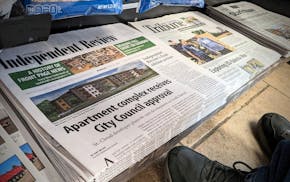Chong Vang stood before a crowd as diverse as his beloved St. Paul neighborhood Saturday and spoke of a youth spent hiding from Communists in the jungles of Southeast Asia. It was there, he said, where his dream of opening his own business in America was born.
His dream came true five years ago when the doors of Destiny Cafe opened on University Avenue in the heart of the Midway neighborhood.
As construction looms for the multi-billion-dollar Central Corridor light-rail line that will forever change the landscape for Vang's business and its customers, he wants to make sure those changes are for the better.
"We can do this together," he told a crowd of 300 gathered at the Lutheran Church of the Redeemer at 285 N. Dale St. "Everyone in this room, we can build it better for our children."
The gathering attracted St. Paul citizens representing a cross-section of ethnic and religious groups advocating for protection for low-income people, small businesses and history in the heart of St. Paul. The area is bracing for change as construction begins on the 11-mile rail line, which will link the downtowns of St. Paul and Minneapolis. The project is slated for completion in 2014.
Healthy Corridor for All, a coalition of St. Paul community groups, unions and churches, organized the event to push this message: Decisions surrounding the Central Corridor project should be made in a way that improves life for the low-income and minority residents that populate the neighborhoods along University Avenue.
That would include preserving or adding jobs in the area, developing and supporting local businesses, keeping housing affordable, and protecting residents from what they called the negative impacts of gentrification.
And, advocates added, given that the construction is a light-rail line, it's urgently important that public transportation stay accessible to the wide swath of residents who rely on it most.
Bryan Paulson, a 26-year-old University of Minnesota researcher who lives along the corridor and commutes by bus to work, said transportation is among his biggest concerns. Construction, he said, is expected to affect a number of vital bus routes in the area.
"These are areas where people most need buses," he said. "You're going to invest a billion dollars on public transportation and hurt the people who most rely on it? That's stupid."
The passionate crowd voiced unanimous support for the coalition's recommendations, made in response to a health impact assessment by PolicyLink, ISAIAH and TakeAction Minnesota, which are affiliated with the coalition. Among that study's findings:
•More than 60 percent of all St. Paul jobs are located along the Central Corridor, and 86 percent of businesses in the area are small businesses.
•Unemployment is slightly higher among Central Corridor residents than in the rest of Ramsey County.
•45 percent of Central Corridor households put more than a third of their income toward housing, up from 33 percent of households a decade ago. If gentrification persists, the study argued, those people could be forced from homes that are no longer affordable.
Healthy Corridor for All intends to pitch a set of zoning solutions that it says would protect Central Corridor residents to the St. Paul City Council before its April vote on a rezoning plan for the area.
City Council Member Russ Stark said everyone shares the same goal -- to not only maintain the quality of life that exists along the Central Corridor, but also to make it more prosperous, with better access to jobs and a variety of housing alternatives.
"This should create new wealth where there was no wealth before," he said. "We will make mistakes along the way, but we will have victories."
Abby Simons • 612-673-4921

BCA says man pointed pistol-style BB gun at officers before he was shot in Woodbury

In Grand Rapids, Itasca Pride is planning its first event, but there is already pushback

Former diversity worker sues University of Minnesota after firing over swastika photo

